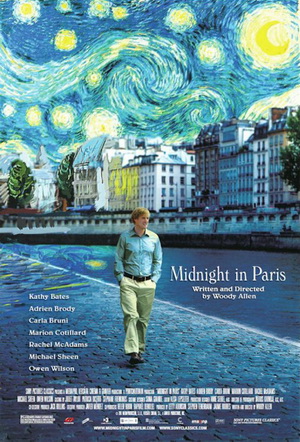
Presenting Woody Allen’s latest cinematic offering, Midnight in Paris is magical – be it in its plot or its effect on you as a viewer.
The moment the movie starts, you know you’re in for a ride. Flashing scenes from the breathtaking French capital, from Versailles to its rooftops. From the Louvres to les Champs-Élysées… it’s all there, to a backdrop of true Parisian music. That opening scene sets the tone of the movie: this is a feature from Paris, to Paris, about Paris. And it doesn’t disappoint.
Gil (Owen Wilson) is a highly successful Hollywood screenwriter on a vacation with his fiancée, Inez (Rachel McAdams) in Paris. Despite his job being very lucrative, Gil doesn’t feel satisfied. He is trying to write a novel about a man who works at a nostalgia shop and has no idea why he can’t truly connect with what he’s writing. He feels out of place in the the world of 2010. His dream world is a rainy 1920’s Paris. Inez disagrees.
On one fateful night, as a Parisian clock strikes midnight, a slightly drunk Gil hops in an old-fashioned peugeot that takes him to meet people he had never thought he’d meet: Scott F. Fitzgerald, Ernest Hemingway, Cole Parker, etc… He sits with these giants of his favorite epoque and discusses with them his life, his hopes, his fears. He also meets Gertrude Stein (Kathy Bates) who gives him some valuable advice about his novel. And while in her study, he looks at Pablo Picasso painting his mistress Adriana (Marion Cotillard).
A relationship soon develops between Adriana and Gil, as he “time travels” to see all of his idols night after night, all after the clock chiming midnight.
Owen Wilson delivers a credible performance as an aspiring novelist, trying to find who he is in the world. His performance is nuanced, especially when he comes off as goofy as he admires his idols of the past. He embodies the Woody Allen-persona to a great extent, as it is the case with most Woody Allen movies that the protagonist is an extension of himself.
But the person that shines the most in this movie is – naturally – Marion Cotillard. Whenever she’s on screen, she steals the scene. It could be her splendid beauty, but I’m sure it’s more her superb acting that doesn’t come off as acting at all. She’s oozing sultriness while staying grounded. She radiates sexuality but manages to be conserved. Just place Cotillard in her natural French element and she’ll give you a tour-de-force breath-taking performance. In a way, she knows how great she is. But she doesn’t dwell on it. She knows she’s stealing every second she is on screen, but she doesn’t let it get to her head, similarly to the city Woody Allen chose to center his movie around.
Other interesting appearances in the movie are made by Carla Bruni, current French president Nicolas Sarkozy’s wife, as a museum curator whom Gil asks: “Do you think it’s possible to love two women at the same time?,” and while Woody Allen has recurrent elements to his movies about infidelity, gorgeous women, etc… his treatment of those themes in “Midnight in Paris” comes off as fresh and sweet, probably helped by the backdrop he uses.
Gad Elmaleh, infamous Moroccan-French comedian, makes a brief appearance as a private detector hired by Inez’s father to check on Gil and his midnight Parisian wanderings.
And out of all the performances by the first rate actors and actresses, it’s Rachel McAdams that comes out short, simply because she has the most underdeveloped character out of the bunch. McAdams gives her best to bring life to her character but to no avail, as Inez ultimately comes off as materialistic.
At the end of the day, “Midnight in Paris” is Paris. It bewitches you, enthralls you, takes you on a magical journey you will not forget. It’s not set in stone, like most of Woody Allen’s movies. Its ending is not resolved, it’s left to be discovered… the purpose of the movie is not to provide answers, as much as to give a general perspective. The movie does give the viewer one message though: live your life fully in your time – there will always be times you think are better. But your time is now.






